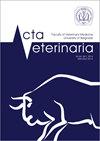The Influence of Zinc and Heavy Metals in Feed and Water on the Quality of Cryopreserved Bull Semen
IF 0.8
4区 农林科学
Q3 VETERINARY SCIENCES
引用次数: 1
Abstract
Abstract This study aimed to assess the influence of different concentrations of zinc (Zn), lead (Pb), mercury (Hg) and cadmium (Cd) found in the feed and water provided to bulls on the concentrations of these metals in cryopreserved bull semen, and to determine their influence onto semen quality parameters. Correlations between heavy metal concentrations in the semen and the quality parameters of semen as estimated by computer-assisted sperm analysis (CASA) and flow cytometry (FC) methods were determined. A total of 40 cryopreserved semen samples originating from bulls housed in 4 different centers for artificial insemination (A, B, C and D) were examined, making a total of 160 samples. The concentrations of metals and semen quality parameters were determined in cryopreserved semen of 10 bulls from each center, namely 4 samples from each bull. Concentrations of Zn, Pb, Hg and Cd in hay and concentrated feed were within the allowed limits as proposed by the National Research Council (NRC, 2000). A strong negative correlation was detected between curvilinear velocity (VCL) and Zn concentrations in the semen (P < 0.01; r = -0.772) in group D, and a positive correlation of VCL with Pb concentrations (P < 0.05 and r = 0.718) in group B. Mercury concentrations in cryopreserved semen correlated negatively to the percent of live sperm cells with intact acrosomes (V/IA: P < 0.05; r = -0.640) and positively with the percent of dead sperm cells with damaged acrosomes (D/DA: P < 0.01; r = 0.766) in group D. This finding confirms the hypothesis that Hg, even at low concentrations, may cause acrosome damage.饲料和水中锌和重金属对冷冻保存公牛精液质量的影响
摘要本研究旨在评估公牛饲料和水中不同浓度的锌、铅、汞和镉对冷冻保存公牛精液中这些金属浓度的影响,并确定它们对精液质量参数的影响。通过计算机辅助精子分析(CASA)和流式细胞术(FC)方法测定了精液中重金属浓度与精液质量参数之间的相关性。共检测了来自4个不同人工授精中心(A、B、C和D)的公牛的40份冷冻精液样本,共计160份样本。测定了来自每个中心的10头公牛的冷冻精液中的金属浓度和精液质量参数,即来自每头公牛的4个样本。干草和浓缩饲料中锌、铅、汞和镉的浓度在国家研究委员会(NRC,2000)提出的允许范围内。曲线速度(VCL)与精液中Zn浓度呈强负相关(P<0.01;r=-0.72),而曲线速度与Pb浓度呈正相关(P<0.05,r=0.718)。冷冻精液中的汞浓度与顶体完整的活精子细胞百分比呈负相关(V/IA:P<0.05;r=-0.640),与D组顶体受损的死精子细胞百分比呈正相关(D/DA:P<0.01;r=0.766)。这一发现证实了汞即使在低浓度下也可能导致顶体损伤的假说。
本文章由计算机程序翻译,如有差异,请以英文原文为准。
求助全文
约1分钟内获得全文
求助全文
来源期刊

Acta Veterinaria-Beograd
农林科学-兽医学
CiteScore
1.30
自引率
16.70%
发文量
33
审稿时长
18-36 weeks
期刊介绍:
The Acta Veterinaria is an open access, peer-reviewed scientific journal of the Faculty of Veterinary Medicine, University of Belgrade, Serbia, dedicated to the publication of original research articles, invited review articles, and to limited extent methodology articles and case reports. The journal considers articles on all aspects of veterinary science and medicine, including the diagnosis, prevention and treatment of medical conditions of domestic, companion, farm and wild animals, as well as the biomedical processes that underlie their health.
 求助内容:
求助内容: 应助结果提醒方式:
应助结果提醒方式:


